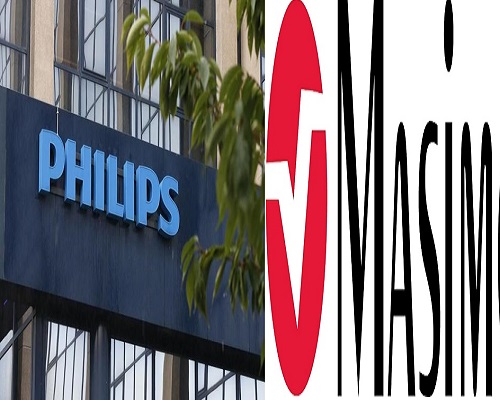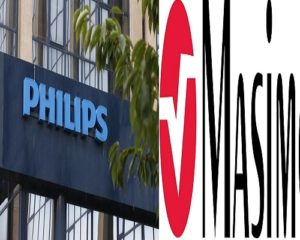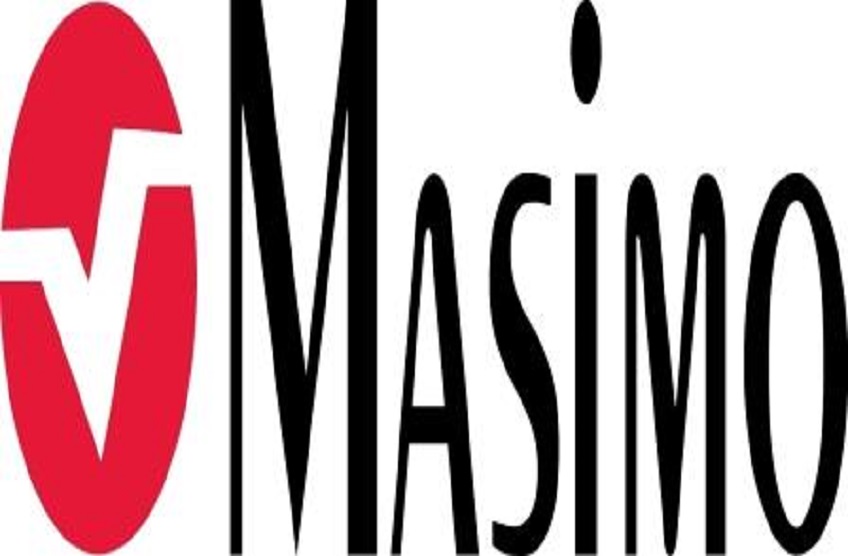Economy
Philips, Masimo Sign Deal On Patient Monitoring, Select Therapy Solutions


By Dipo Olowookere
A multi-year business partnership agreement has been sealed between Philips and Masimo Corporation focused on innovations in patient monitoring and therapy solutions.
The partnership, Business Post leant, includes joint marketing and sales programs in North America and certain markets in Asia and Europe for Masimo’s non-invasive sensor technologies, such as its rainbow and SET platforms, in conjunction with Philips’ patient monitoring and select therapy solutions.
In addition, Philips will in the future integrate Masimo SedLine brain function monitoring, O3 regional oximetry, and Nomoline capnography technologies in certain Philips IntelliVue monitors.
Philips is a global leader in patient monitoring solutions with a comprehensive product portfolio ranging from multi-parameter bedside monitors to wearable patient monitors combined with mobile applications and clinical decision support tools.
With a primary focus on prediction and prevention of patient deterioration, these integrated solutions aim to support clinical workflow and caregiver efficiencies, and enhance patient care. In 2015, an estimated 275 million patients were monitored using Philips’ patient monitoring solutions.
Sensor and signal processing technologies are an essential component of patient monitoring solutions, and Masimo is a prolific innovator in this field. Examples of Masimo’s non-invasive sensor and signal processing technology innovations include Masimo SET pulse oximetry, Masimo rainbow Pulse CO-Oximetry and Masimo total hemoglobin (SpHb) monitoring technology.
“This business partnership agreement marks an important day for us and our customers as two leaders in patient monitoring collaborate to develop solutions designed to enhance clinical outcomes and patient safety,” said Frans van Houten, CEO of Royal Philips. “I am very satisfied that we have reached an agreement that is beneficial for both companies and that we have ended our legal disputes. Going forward, Philips and Masimo will completely focus on jointly delivering meaningful innovations to our customers, such as the integration of Masimo rainbow technology across our IntelliVue patient monitoring product range.”
“It’s wonderful to think that Masimo and Philips will be working together for the benefit of patients and clinicians around the world,” said Joe Kiani, Chairman and CEO of Masimo. “I am delighted that we were able to reach this important agreement which allows us to focus on the future to deliver the solutions that our customers have been looking for.”
In conjunction with the appropriate Philips patient monitoring platform, Masimo’s rainbow SET technology analyzes multiple wavelengths of light to accurately measure total hemoglobin (SpHb), oxygen content (SpOC), carboxyhemoglobin (SpCO), methemoglobin (SpMet) and Pleth Variability Index (PVI) non-invasively and continuously. Continuous monitoring of SpHb on a Philips monitor at the point of care provides clinicians with real-time visibility to changes in hemoglobin in between invasive blood samplings.
Anticipated cash flow and income consequences for Philips
As part of the business partnership agreement, Philips and Masimo have agreed to end all pending lawsuits between the two companies, which includes that Philips is released from paying the $467 million jury verdict that was awarded to Masimo in October, 2014.
Philips has agreed to make a $300 million cash payment to Masimo in the fourth quarter of 2016; and to invest in the relationship by making certain marketing and product integration commitments over the coming years. Entering into the business partnership agreement has minimal impact on income from operations (EBIT) in the fourth quarter of 2016.
Anticipated cash flow and income consequences for Masimo
As the result of anticipated legal fee savings during the fourth fiscal quarter, Masimo now expects its fiscal 2016 GAAP earnings per diluted share, exclusive of the impact of the business partnership agreement, to be $2.14, up from $2.13.
Masimo expects to use some of the after-tax proceeds from the business partnership agreement to repay amounts outstanding under its revolving line of credit. The guidance set forth above is an estimate only and actual performance could differ.
Economy
Champion Breweries Concludes Bullet Brand Portfolio Acquisition

By Aduragbemi Omiyale
The acquisition of the Bullet brand portfolio from Sun Mark has been completed by Champion Breweries Plc, a statement from the company confirms.
This marks a transformative milestone in the organisation’s strategic expansion into a diversified, pan-African beverage platform.
With this development, Champion Breweries now owns the Bullet brand assets, trademarks, formulations, and commercial rights globally through an asset carve-out structure.
The assets are held in a newly incorporated entity in the Netherlands, in which Champion Breweries holds a majority interest, while Vinar N.V., the majority shareholder of Sun Mark, retains a minority stake.
Bullet products are currently distributed in 14 African markets, positioning Champion Breweries to scale beyond Nigeria in the high-growth ready-to-drink (RTD) alcoholic and energy drink segments.
This expansion significantly broadens the brewer’s addressable market and strengthens its revenue base with an established, profitable portfolio that already enjoys strong brand recognition and consumer loyalty across multiple markets.
“The successful completion of our public equity raises, together with the formal close of the Bullet acquisition, marks a defining moment for Champion Breweries.
“The support we received from both existing shareholders and new investors reflects strong confidence in our long-term strategy to build a diversified, high-growth beverage platform with pan-African scale.
“Our focus now is on disciplined execution, integration, and delivering sustained value across markets,” the chairman of Champion Breweries, Mr Imo-Abasi Jacob, stated.
Through this transaction, Champion Breweries is expected to achieve enhanced foreign exchange earnings, expanded distribution leverage across African markets, integrated supply chain efficiencies, portfolio diversification into high‑growth consumer beverage categories, and strengthened presence in the RTD and energy drink segments.
The acquisition accelerates Champion Breweries’ transition from a regional brewing business to a multi-category consumer platform with continental reach.
Bullet Black is Nigeria’s leading ready-to-drink alcoholic beverage, while Bullet Blue has built a strong presence in the energy drink category across several African markets.
Economy
M-KOPA Nigeria Plans Expansion to Edo, Others After N231bn Credit Milestone

By Adedapo Adesanya
Emerging market fintech firm, M-KOPA, has announced plans to deepen its reach in Nigeria to the South South and South East regions, starting with Edo this year, after providing N231 billion in credit to over 1 million customers in the country.
The firm released its first Nigeria-focused Impact Report, which showed that Nigeria is M-KOPA’s fastest-growing market and fastest to reach the milestone.
Since its foray into the Nigerian market in 2019, M-KOPA has been working to dismantle barriers to financial inclusion by providing flexible smartphone financing and digital financial tools that align with how people in the informal economy earn and manage their money.
It operates in six states in the country, including Lagos, Ogun, and Oyo, among others.
The report highlights the company’s contribution to income generation, digital inclusion and economic opportunity for Every Day Earners across the country.
The report showed that M-KOPA has enabled 290,000 first-time smartphone users, while 56 per cent of agents accessed their first income opportunity through the platform.
It showed high income and livelihood gains among its users, with about 77 per cent of customers leveraging smartphones or digital loans obtained through the platform to generate income, indicating that access to financed devices is directly supporting micro-entrepreneurial activity and informal sector productivity.
Furthermore, 75 per cent of users report higher earnings since gaining access to M-KOPA’s services, suggesting measurable improvements in personal revenue streams. On the distribution side, 99 per cent of agents disclose increased earnings, reflecting positive spillover effects across the company’s value chain.
In addition, 81 per cent of long-term customers state that their household expenses have improved, pointing to enhanced financial stability and better consumption smoothing over time.
Speaking on the report, Mr Babajide Duroshola, General Manager, M-KOPA Nigeria, said, “Nigeria represents extraordinary potential, and we’re proud that it has become M-KOPA’s fastest-growing market. Our Impact Report shows that when Every Day Earners gain access to the right digital and financial tools, they use them to create stability and long-term progress for their families. This is about access that unlocks opportunity and sustained prosperity.”
On its expansion plans Nigeria-wide, the M-KOPA helmsman said, “Many of the states we are considering are already similar to the ones we are currently in proximity… So, there is proximity and similarity between these states, and that’s what we are going to do, starting with Edo.”
He noted that as M-KOPA Nigeria continues to expand, the focus remains on ensuring more everyday earners gain access to the digital and financial tools they need to build resilient, prosperous futures in Nigeria’s rapidly digitising economy.
Economy
Tinubu Okays Extension of Ban on Raw Shea Nut Export by One Year

By Aduragbemi Omiyale
The ban on the export of raw shea nuts from Nigeria has been extended by one year by President Bola Tinubu.
A statement from the Special Adviser to the President on Information and Strategy, Mr Bayo Onanuga, on Wednesday disclosed that the ban is now till February 25, 2027.
It was emphasised that this decision underscores the administration’s commitment to advancing industrial development, strengthening domestic value addition, and supporting the objectives of the Renewed Hope Agenda.
The ban aims to deepen processing capacity within Nigeria, enhance livelihoods in shea-producing communities, and promote the growth of Nigerian exports anchored on value-added products, the statement noted.
To further these objectives, President Tinubu has authorised the two Ministers of the Federal Ministry of Industry, Trade and Investment, and the Presidential Food Security Coordination Unit (PFSCU), to coordinate the implementation of a unified, evidence-based national framework that aligns industrialisation, trade, and investment priorities across the shea nut value chain.
He also approved the adoption of an export framework established by the Nigerian Commodity Exchange (NCX) and the withdrawal of all waivers allowing the direct export of raw shea nuts.
The President directed that any excess supply of raw shea nuts should be exported exclusively through the NCX framework, in accordance with the approved guidelines.
Additionally, he directed the Federal Ministry of Finance to provide access to a dedicated NESS Support Window to enable the Federal Ministry of Industry, Trade and Investment to pilot a Livelihood Finance Mechanism to strengthen production and processing capacity.
Shea nuts, the oil-rich fruits from the shea tree common in the Savanna belt of Nigeria, are the raw material for shea butter, renowned for its moisturising, anti-inflammatory, and antioxidant properties. The extracted butter is a principal ingredient in cosmetics for skin and hair, as well as in edible cooking oil. The Federal Government encourages processing shea nuts into butter locally, as butter fetches between 10 and 20 times the price of the raw nuts.
The federal government said it remains committed to policies that promote inclusive growth, local manufacturing and position Nigeria as a competitive participant in global agricultural value chains.
-

 Feature/OPED6 years ago
Feature/OPED6 years agoDavos was Different this year
-
Travel/Tourism10 years ago
Lagos Seals Western Lodge Hotel In Ikorodu
-

 Showbiz3 years ago
Showbiz3 years agoEstranged Lover Releases Videos of Empress Njamah Bathing
-

 Banking8 years ago
Banking8 years agoSort Codes of GTBank Branches in Nigeria
-

 Economy3 years ago
Economy3 years agoSubsidy Removal: CNG at N130 Per Litre Cheaper Than Petrol—IPMAN
-

 Banking3 years ago
Banking3 years agoSort Codes of UBA Branches in Nigeria
-

 Banking3 years ago
Banking3 years agoFirst Bank Announces Planned Downtime
-

 Sports3 years ago
Sports3 years agoHighest Paid Nigerian Footballer – How Much Do Nigerian Footballers Earn













